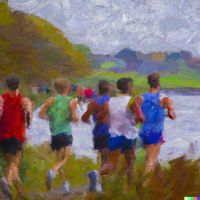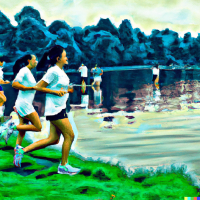Half Marathon Training - What Time to Expect?
by Johnathan
(Evans, Ga)

Answer by Dominique:
Hey there,
I'm glad you've reached out about preparing for your first half marathon - what an exciting prospect for you and your son! You're entering a great adventure, and I'm here to help guide you through it. Let’s break down your question into manageable chunks:
1. Realistic time for your half marathon
2. Right base of training for this prediction
3. Half marathons for young people
4. Some useful links for further development
Realistic Time for Your Half Marathon

So if you're running a 10k at a 9-minute mile pace, you're crossing the finish line in roughly 56 minutes. Doubling your time gets you to 112 minutes. Add on another 20 minutes, and you'll be looking at approximately 132 minutes or just over two hours for the half marathon. You can also give the Race Conversion Calculator a try - it can get pretty close to the projected finish time!
Right Base of Training for This Prediction
But here's an important thing to consider: these guidelines assume that you’re doing the right kind of training. For half marathons, you'd generally want to get your long run up to at least 10 miles. Generally writing half marathon schedules for beginners looking to finish, I like to put in an 11 mile run as the longest distance. It just makes that gap to 13.1 a lot more manageable. That's also based on my own experience. My first half marathon I did on half-baked training and my longest run was 10 miles. The final 5k (3.1 miles) were very tough.
So, as you continue to train, try to slowly increase your mileage so you're better prepared. If you find there's not enough time to increase your runs' distances safely, then targeting a two-hour finish time might be a bit too ambitious for this race. Remember that it's okay to take your time and adopt a more conservative pace if needed. It’s much better to finish strong and steady rather than feeling completely drained halfway through the race.
Half Marathons for Young People

A good distance for young, up-and-coming runners, would be a 5k or 10k race, as these are both realistic and manageable distances. Encourage your son to focus on pace, form, and endurance in these shorter races before progressing to longer distances.
As an accredited running coach, a lot of my focus is on "rather safe than sorry". A lot of the coaching training is about keeping people safe, young and old. There is a personal accountability and duty of care that comes with coaching that means you sometimes need to say "it is better if you don't". This is one of those occassions.
I'd much rather see your son running shorter distances at this stage of life. This will cultivate good habits, safe practices, and a healthy love for the sport. He will still have plenty of time to progress to longer races in the future, and there's no need to rush!
Some Useful Links for Further Development

Increasing Mileage Safely - It's all about safely upping your mileage to prevent injuries and allow your body to adapt.
Half Marathon Running Program - This is a useful running program for beginners preparing for a half marathon. Try some of the running training ideas from the schedule.
I hope all this helps, and remember to enjoy your training sessions as you prepare for your big race. Good luck!
Kind regards,
Dominique


